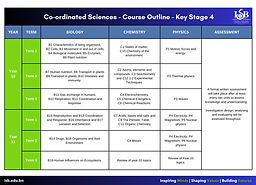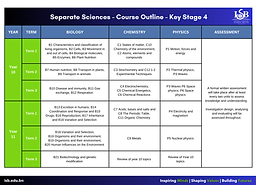
Science
The intent of the science curriculum is to ignite students' curiosity about the world around them, develop scientific thinking, and equip them with a deep understanding of natural phenomena. It aims to foster a sense of wonder and critical inquiry, encouraging students to ask questions, investigate phenomena, and make sense of natural and physical processes. Our intent is to build a solid foundation in biology, chemistry, and physics. The curriculum prepares students for future scientific learning and helps them to appreciate the international nature of science and its relevance in everyday life.
The science curriculum is structured around the progressive development of scientific knowledge and understanding and the development of scientific skills. Throughout the curriculum, students engage in hands-on experiments, data collection, and critical analysis, which help them develop essential investigative skills. These include developing hypotheses, planning methodologies, observing and recording results, processing data, analysis and evaluation. The aim is to foster a deeper understanding of the scientific method and recognize the importance of evidence-based reasoning.
Additionally, the curriculum aims to show how scientific advancements have impacted society and the environment. By the end of their education, students should be able to think critically, approach problems methodically, and appreciate the role of science in solving global challenges.
Subject Staff

Head of Faculty

Teacher

Teacher

Teacher

Teacher

Teacher

Teacher

Teacher

Curriculum Journey
Science Curriculum

Curriculum Outline

Assessment Criteria
Key Stage 3 (Year 7-9)
Key Stage 4 (Year 10 & 11)

Co-ordinated Sciences Outline

Separate Science Outline
Pre-U (Year 12 & 13)

Year 12 Science Outline

Year 13 Science Outline
Which degrees does this IB subject complement?*
Genetics
Neuroscience
Zoology
Marine biology
Ecology
Agriculture
Sport & Exercise Science
Geology
Dentistry
Medicine
Veterinary Medicine
Physiotherapy
Forensic Science
Speech & Language Therapy
Nursing
Midwifery
Biology
Dentistry
Medicine
Veterinary Medicine
Pharmacy
Chemical Engineering
Computer Science
Materials Science
Geology
Nursing
Forensic Science
Biochemistry
Dietetics
Chemistry
Architecture
Engineering
Product Design
Computer Science
Pharmacy
Materials Science
Radiography
Physics
Environmental Science
Agriculture
Geography
Geography
Ecology
Climate Science
Earth Sciences
E.S.S.
*The degrees listed are some examples of courses that the subject supports but this is not an exhaustive list. In addition, please note that these subjects are not compulsory for each degree. Please consult individual university websites for specific requirements for their courses.





